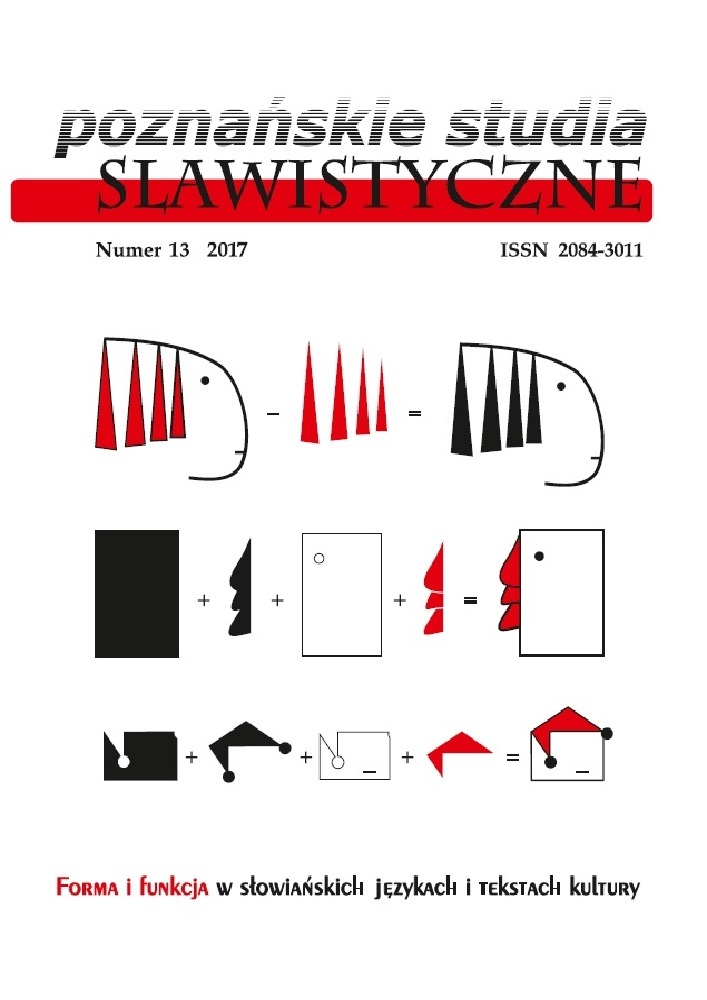Abstrakt
In the article, I have decided to sketch a brief portrait of the most significant Russian formalist Viktor Shklovsky. In order to comment upon his contribution to the development of literary theory, I cast some light on his original term ostranenie (estrangement, defamiliarization), which allows the formalist to expose the essential features of writing based on unlimited changes of the plot: they always assume a participation of irony, parody, and reinvention in art. The listed devices determine the progress in literature, which makes use of the old conventions to create new ones what occurs in the course of transgressing consolidated forms and functions. What is more, the process of transgression (or – to be more precise – self-transgression) is manifested by a disruptive activity of irony at the same time collaborating with literary traditions and thwarting them with the force of the eternal, perpetual reinvention.Bibliografia
Boym, S. (2005). Poetics and Politics of Estrangement: Viktor Shklovsky and Hannah Arendt. “Poetics Today”, 26, 4 (winter).
https://doi.org/10.1215/03335372-26-4-581
Burzyńska, A., Markowski, M.P. (2007). Teorie literatury XX wieku. Podręcznik. Kraków: Wydawnictwo Znak.
Byrd, C., (2007). An exile at home. “The Guardian”. http://www.theguardian.com/books/2007/nov/06/featuresreviews.guardianreview. 29.03.2017.
Cohen, J. (2007). The Formalist’s Formalist: On Viktor Shklovsky. http://forward.com/culture/12055/the-formalist-s-formalist-00813. 29.03.2017.
Derrida, J. (1992). Acts of Literature. Ed. D. Attridge. New York–London: Routledge.
Foltz, J. (2010). In Search of Lost Plots: On Viktor Shklovsky. “The Los Angeles Review of Books”. http://lareviewofbooks.org. 29.03.2017.
Grodzinski, E. (1989). Jan Baudouin de Courtenay o wpływie języka na światopogląd. In: Jan Baudouin de Courtenay a lingwistyka światowa. Materiały z konferencji międzynarodowej Warszawa 4-7 września 1979. Eds J. Rieger, M. Szymczak, S. Urbańczyk. Wrocław: Zakład Narodowy im. Ossolińskich.
Hanse-Löve, A.A. (1978). Der Russische Formalismus. Vienna: Österreichische Akademie der Wissenschaften.
Hartman, C.O. (1980). Free Verse. An Essay on Prosody. Illinois: Northwestern University Press.
Hartman, G.H. (1980). Criticism in the Wilderness. The Study of Literature Today. New Haven–London: Yale University Press.
Mayenowa, Z. (1970). Saloni. Warszawa: Państwowy Instytut Wydawniczy.
Neubauer, J., Stewart, N. (2004). Shandean Theories of the Novel: From Friedrich Schlegel’s German Romanticism to Shklovsky’s Russian Formalism. In: The Reception of Lawrence Sterne in Europe. Eds. P. de Voogd, J. Neubauer. London–New York: Thoemmes Continuum, pp. 259–280.
Oever, A. van den (2010) (ed.). Ostranenie. On ‘Strangeness’ and the Moving Image. The History, Reception, and Relevance of the Concept. Amsterdam: Amsterdam University Press.
Saussure, F. de (1986). Course in General Linguistics. Eds. C. Bally, A. Sechehaye. Collaboration A. Riedlinger. Trans. E. Harris. Chicago–La Salle, Illinois: Open Court.
Shklovsky, V. (2001). Zoo, or Letters Not about Love. Trans. R. Scheldon, McLean. Illinois: Dalkey Archive Press.
Shklovsky, V. (2004). Art as Technique. In: Literary Theory: An Anthology. Eds. J. Rivkin, M. Ryan. Malden, MA: Blackwell, pp. 15–21.
Shklovsky, V. (2007). Energy of Delusion. A Book on Plot. Trans. S. Avagyan. Champaign, Illinois: Dalkey Archive Press.
Szkłowski, W. (1965). Ze wspomnień. Trans. A. Galis. Warszawa: Państwowy Instytut Wydawniczy.
Szkłowski, W. (1970). Wskrzeszenie słowa. W: Rosyjska szkoła stylistyki. Eds M.R. Mayenowa, Z. Salomi. Warszawa: Państwowy Instytut Wydawniczy.
Ulicka, D. (2007). Literaturoznawcze dyskursy możliwe. Studia z dziejów nowoczesnej teorii literatury w Europie Środkowo-Wschodniej. Kraków: TAiWPN Universitas.
Licencja

Utwór dostępny jest na licencji Creative Commons Uznanie autorstwa – Bez utworów zależnych 4.0 Międzynarodowe.
